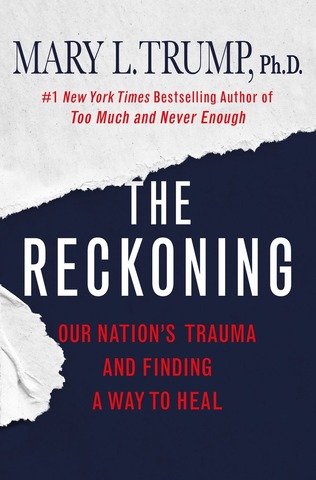
There is something medicinal about hearing straight truth. With no affiliation to anything but the truth, clinical psychologist Mary L. Trump writes with muscular clarity, scholarship, and fury about anybody who acts in denial of the truth—from the beginnings of the practice of enslaving and torturing Black people to Obama and his justice department refusing to prosecute the architects of the Great Recession to the wanton cruelty and pathological lying of her uncle Donald to the January 6th insurrection to Joe Biden and Kamala Harris stating that this is not a racist country even though there is systemic racism. Even the Supreme Court and Jimmy Carter don't get away without condemnation.
Mary Trump writes with the heat of a wildfire and truncates American history in a way that makes its carefully crafted hypocrisy even more shocking. There is not a lot of new material if you've been educating yourself with whole history (as opposed to filtered white history) and if you follow the news. That said, if you haven't been reading book after book on racism, antiracism, and the history of racism, this is an excellent summation and exposure of the creation of ongoing systemic racism. But whatever your level of education, you will benefit from the passion of the writing steeped in scholarship and the laser focus that makes this book vibrate.
It is a book about the historical creation of our national trauma. Trauma comes not simply from the brutality and torture of slavery and genocide done with impunity that form the foundation of the U.S.A., but it comes from many "good" people looking the other way because the inconvenience of addressing and redressing the wrong was/is just too damned hard. It comes from denial and lies to justify the unjustifiable. It comes because people are reluctant to give up anything—money, power, complacency, peaceful co-existence with people who would be offended if they rocked the boat, "willful blindness. (115)" And all this was there long before it manifested Donald J. Trump.
The introduction to The Reckoning is one of the best book intros I've read. In it Mary Trump recounts her own history of PTSD and going into a full crisis that led to a stint in a rehab treatment facility after the election of her uncle. All that along with her grounded knowledge of psychology bring something unique to the book—well served by the fact that she is such a good writer.
This is not a "Trump book." It is an us/U.S. book. It is a fearless demand that we Americans look at who we are, who we have been, how we birthed the current divisions and violence, and acknowledging the wrongs, atone and repair.
* * *
Years ago I wrote a proposal and chapters for a book that I never sold. It is a nonfiction, researched book about trauma, healing trauma, and learning to thrive. I realize that a lot of traumatized peoples' problem is an inability to recognize that they are indeed traumatized—in the throes of a physiological response. In fact I would not be at all surprised if many people read Mary Trump's book and don't connect their upset to what she painstakingly describes as our national trauma.
Mary Trump's book does not address any of this, but I'm so inspired by what she did write that I've made the beginning of my book that never sold into a 9,000-word Kindle ebook to help people recognize what may have been going on undiagnosed for their entire lives and, with the current cultural upset, may have been triggered into what seems like perpetual upset. You can get it here: Learning to Thrive: Begin by Recognizing Your Trauma, a Primer for 99 cents, the lowest sale price amazon allows.
Godspeed to all of us. Let us heal!

9/25/21 Update—Connecting the Dots
I've long since returned Mary Trump's book to the library, but I'm still contemplating it, and it occurs to me that there is a missing piece between her book and the little ebook I offer to recognize trauma.
So I'd like to spell it out:
If you grow up in a family where abuse, violence, and/or denying the truth are normal, there is some point, early on, when you feel pain and confusion.
Some people respond to this discomfort by joining the charade and they perpetuate it, actually convinced that it is normal. And if challenged, their illusion of superiority or entitlement to behave as they do is challenged, and since this is their whole self-image, they will fight like hell to protect their right to be who they are.
Some people are devastated by the abuse, violence, and/or denial. Throughout their lives, when something happens to remind them of it, they have traumatic, dramatic responses that they may believe the circumstances merit, or if they sense there is something wrong, they don't know what to do about it. They may go to talking therapy where they tell and retell their stories, but all this does is reinforce their belief in the truth of what happened and therefore the justification and inevitabilityof their responses. Nothing changes.
As a country, we have a well-documented history of abuse, violence, and denying the truth. Whether you have chosen to carry on this behavior, convinced that it is normal and justified, or whether you are frequently disabled by your dramatic responses to it, you are traumatized.
Both perpetrators and victims of abuse, violence, and denial are traumatized because they have been disconnected from their deepest truth that we are loving beings who all want to be respected and loved and valued.
Current culture has brought the whole history of abuse, violence, and denial into everyday life.
We are all traumatized.